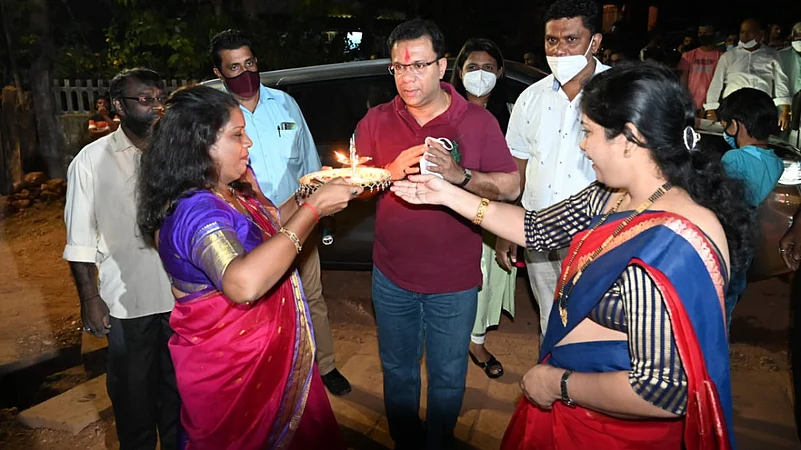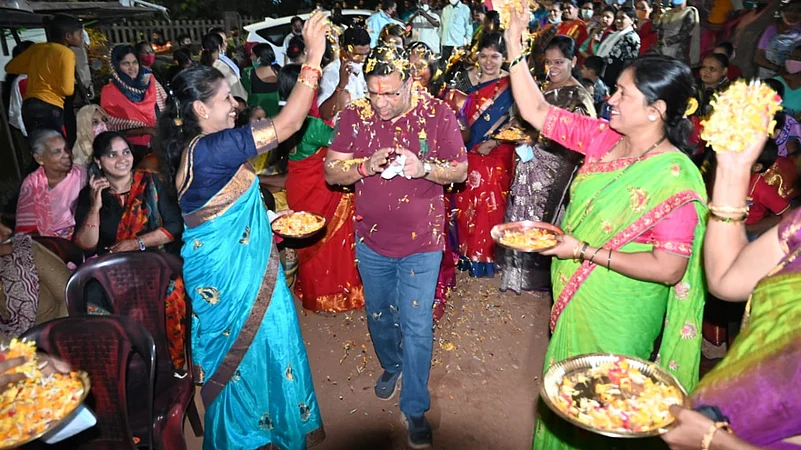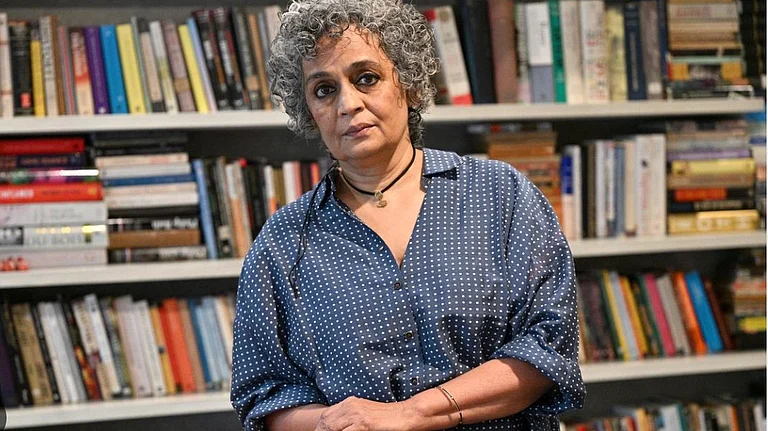In September 2021, Devendra Fadnavis, the BJP’s election in-charge in Goa, made a pitstop at the sprawling house of Michael Lobo. This was to persuade the Bardez taluka strongman to stay with the party after reports surfaced that he was flirting with AAP and Congress. Lobo, who is Calangute MLA and Minister of Ports, wields strong influence in the taluka, which has seven seats. Bardez, in North Goa, is part of a prosperous coastal belt and is a huge money-spinner for the local economy. The one-hour meeting did not go well. Lobo was adamant about his demands, which included a ticket for his wife Delilah, responsibility of the entire Bardez ticket distribution and an important portfolio in the next government. Parra, where Michael Lobo lives, was once known as the village for watermelons, now boasts of fancy resorts and upmarket cafes. Lobo’s wife, Delilah, has been the sarpanch of Parra panchayat for the last five years.
II
In 2012, Manohar Parrikar was promising a change. He was riding on the massive anti-incumbency of the Digambar Kamat-led Congress government. His campaign focussed on the ‘Family Raj’ of the Congress government, helping him pillory the Monserrate, Rane, Naik, Alemao families of Goa. He had vowed to send the ‘six-member family’ home. Churchill Alemao, the South Goa strongman, got four tickets for his family members in the 2012 election. The results were in the favour of the BJP and the Alemao family, with Churchill, his brother Joaquim, daughter Valanka and Joaquim’s son Yuri losing the elections. The ‘family raj’ campaign had struck a chord with the masses and Parrikar emerged as a new leader.

III
Cecille Rodrigues is the firebrand activist of Taleigao, a suburb of Panjim. Taleigao is also the constituency of Jennifer Monserrate, cabinet minister and two-term MLA. This is where most of Panjim’s newer apartments and high-rises have mushroomed in recent years. Now an Aam Aadmi Party candidate fromTaleigao, Cecille started as an activist against bad roads and deadly unmarked speed breakers on Goan roads. Jennifer has been unavailable to her constituents, and the way the farmers have been treated and their lands were taken over for a new Panchayat office speak volumes about how much muscle the Monserrate family has in Taleigao.
Atanasio ‘Babush’ Monserrate was instrumental in the defection of 10 Congress MLAs in 2019, which allowed the BJP to have a comfortable majority in the incumbent Assembly. The BJP seems grateful for that, as acknowledged by Goa-in charge Devendra Fadnavis. Fadnavis has been firefighting the defections and also trying to manage the expectations of MLAs and their family members seeking tickets. “Goa has some legacy issues and we have to work with that, but despite that, we have very few candidates from the outside.” On Babush, Fadnavis was very emphatic, “Not just the legacy issue, you have taken someone in your party and run your government on their support for three years. Now, we cannot say that we will dump you,” and so Utpal Parrikar, the son of Manohar Parrikar, was refused a ticket and the party placed its faith in Babush. A three-term MLA, Babush has been accused of raping a minor and also attacking a police station. In both cases, the trial hasn’t started and seems unlikely till the time he is in power.
Out of the 40 seats in the Goa Assembly, ten seats — a staggering 25 per cent — are being contested by the husband and wife duo: Two in the BJP, one in Congress, one in the TMC and one independent. But it doesn’t stop at that. The Alemao father-daughter duo is contesting on TMC tickets, whereas their alliance partner MGP has two brothers contesting.

Is it real women empowerment when spouses are given seats? Professor Uttara Sahasrabuddhe of Mumbai University’s Department of Civics and Politics disagrees. “It’s a form of neo-feudalism. There is no level playing field if these kinds of political families exist, it’s an impact of our society continuing to be in a feudal mindset, and yet we are running a political system which is a democracy,” says. She adds that it is a fact that politicians create and nurture their constituencies and, once in power, like to keep it in their family to share the benefits.
Trinamool Congress, the new entrant to Goan politics, has also fielded a couple. Party’s Goa president Kiran Kandolkar has got a seat from Aldonha, while his wife Kavita is contesting from the neighbouring Thivim. “In India, we always had family raj — Gandhis, Yadavs and others. Why is Goa being singled out?” asks Kandolkar. However, the party’s spokesperson Om Prakash Tiwari said that tickets were allotted after a survey and were not based on family requests.
In the distant Sattari taluka, the Ranes have been in power, with the family patriarch and former chief minister Pratap Singh Rane being a member of the Goa Assembly for 50 years. For this election, he withdrew his nomination at the last minute after his daughter-in-law filed her nomination on a BJP ticket for the Poriem seat. As a political novice, Divya couldn’t have asked for a better start to her political career. The Poriem seat has been held by Rane senior since 1989. The Ranes, Vishwajit and Divya, refused to be interviewed for this story.
Chandrakant Kavlekar, the deputy chief minister of Goa, wasn’t too lucky. His wife Savitri Kavlekar, vice president of BJP’s Mahila Morcha, was certain she would get a ticket for the Sanguem constituency. Her husband is contesting from the neighbouring Quepem constituency. But the state BJP had other plans; if they gave to the Kavlekars, they would have to give to Lobos and they did not want to set that precedent. The logic was that the Monserrate family was already in the electoral fray and Rane senior was going to relinquish his seat for his daughter-in-law. Savitri quit the BJP and is now an independent candidate from Sanguem.
We are at Delilah Lobo’s mansion in Parra. There is plenty of activity in the Lobo house, a booth meeting has been organised and a buffet dinner has been laid out. Her name is constantly being announced on the microphone, as she is speaking to us. We had barely started speaking talking when, Michael — freshly showered from a long day of campaigning — interrupts us. “They have announced your name, you should be on the dais,” he asserts in Konkani. Delilah excuses herself and leaves immediately. Michael Lobo is the Bardez strongman, who was previously with the BJP and now Congress’s biggest hope. Although a veteran of panchayat politics, Delilah is new to the state arena. In a meeting with women voters, she spells out how Parra has been transformed, with smooth roads and development. Siolim has never been won by Congress and Delilah aims to write history. The diminutive sarpanch says that she told Fadnavis months ago that she will contest the Siolim seat. “He had come to my house, and I told him clearly. We were in BJP during Manohar Parrikar’s time. He had certain values and ideals. When he passed away, those values have been eroded. His son has been refused a seat in Panjim. Where his son has no place, where are we?”
Advocate Celofato Coutinho has followed Goan politics for a long. He sees this seats allocation to family members as means to control the entire talukas versus only the constituency. Michael Lobo in Bardez, Vishwajit Rane in Sattari, Chandrakant Kavlekar in Sanguem, Atanasio Monserrate in Tiswadi wield considerable influence, but their bargaining power increases with the number of MLAs in their kitty. “This kind of nepotism is peculiar to Goa because of the small voter base in the constituencies.” The average constituency size is less than thirty thousand voters across the 40 seats.
“In a personality-based electoral politics, the party has very little, even if the personality leaves a party, he or she can win easily,” he says.

(Kashif Khusro is a Goa-based freelance journalist and writer)





















